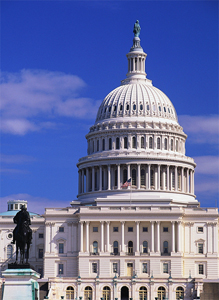
 As reported here last week, the Senate Judiciary Committee passed the PATENT Act bill, with a Managers Amendment that includes several IPR-specific provisions.
As reported here last week, the Senate Judiciary Committee passed the PATENT Act bill, with a Managers Amendment that includes several IPR-specific provisions.
With this Amendment, the PATENT Act now has two major components: changes to IPRs to help counterbalance the Litigation Reform efforts. It seems to signal a compromise brewing among moderate forces in the various camps -- the Pharma sector might accept Litigation Reform if there are fixes to the IPR regime. And the Tech sector might accept changes to the IPR regime if there are further improvements to Litigation Reform.
The primary IPR provisions with the Manager's Amendment to the PATENT Act are as follows:
EVIDENCE:
Concern: The petitioner could put in declarations, affidavits, etc., but the patent holder is limited to attorney arguments in response to the petition. This is an issue of fairness, particularly where witness credibility or fact issues arise.
Managers' Amendment (pp. 42-43): The patent owner can put in affidavits or declarations of supporting evidence and opinions in its preliminary response. The petitioner may seek leave to file a reply to respond to new issues raised in the preliminary response.
REVIEW BASED ON SAME EVIDENCE AS CONSIDERED BY COURTS:
Concern: In some cases where the PTAB has taken on review after the district court, it has addressed the same evidence as the district court. The PTAB has actually cited the different standards of review as a basis for granting a petition. As a result, there have been requests to amend so that if courts considered the same or substantially the same evidence, the PTAB must give deference to district court decision.
Managers' Amendment (Section 11, pp. 43-44): The PTAB should consider the interests of justice -- whether the same or substantially the same evidence has been involved in a court proceeding.
STANDARDS AND BURDEN OF PROOF:
Concern: Differing standards in PTAB trials from district court litigation have made the PTAB look like a death squad. Many, especially in the pharmaceutical and biotech sectors, have requested that the PTAB apply uniform standards as the district courts -- 3 prongs:
1) Phillips' ordinary and customary claim construction standard to be applied as opposed to broadest reasonable interpretation, 2) clear and convincing evidence invalidity standard to be applied, and
3) presumption of validity to be applied throughout the course of proceedings.
Managers' Amendment (Section 11, pp. 48, 50): District Court Philips standard and presumption of validity (1 and 3 only). Clear and convincing evidence not in amendment and burden is still the same (preponderance). It is not clear how a presumption would be applied if the standard is not clear and convincing evidence.
ABILITY TO AMEND CLAIMS:
Concern: Lack of a real opportunity to amend -- combined with broadest reasonable interpretation, this makes PTAB trials particularly problematic. Amendment has only been permitted in a handful of IPRs to date.
Managers' Amendment (Section 11, pp. 55-56): Regulations to be promulgated that allow substitute claims under certain conditions. Also, currently permits challenger to argue "unpatentability" -- not clear whether challenger can raise 112 arguments against amended claim.
INSTITUTION:
Concern: Merits panel having the same composition decides on the institution of the petition and then resolves final decision –- viewed as stacked against patent holder because the same group that made the initial decision to institute may be pre-disposed regarding patentability in reaching a final decision.
Managers' Amendment (Section 11, p. 57): No more than one decision maker can overlap with merits panel; regulations may prescribe that a different group than the PTAB make the decision to institute altogether.